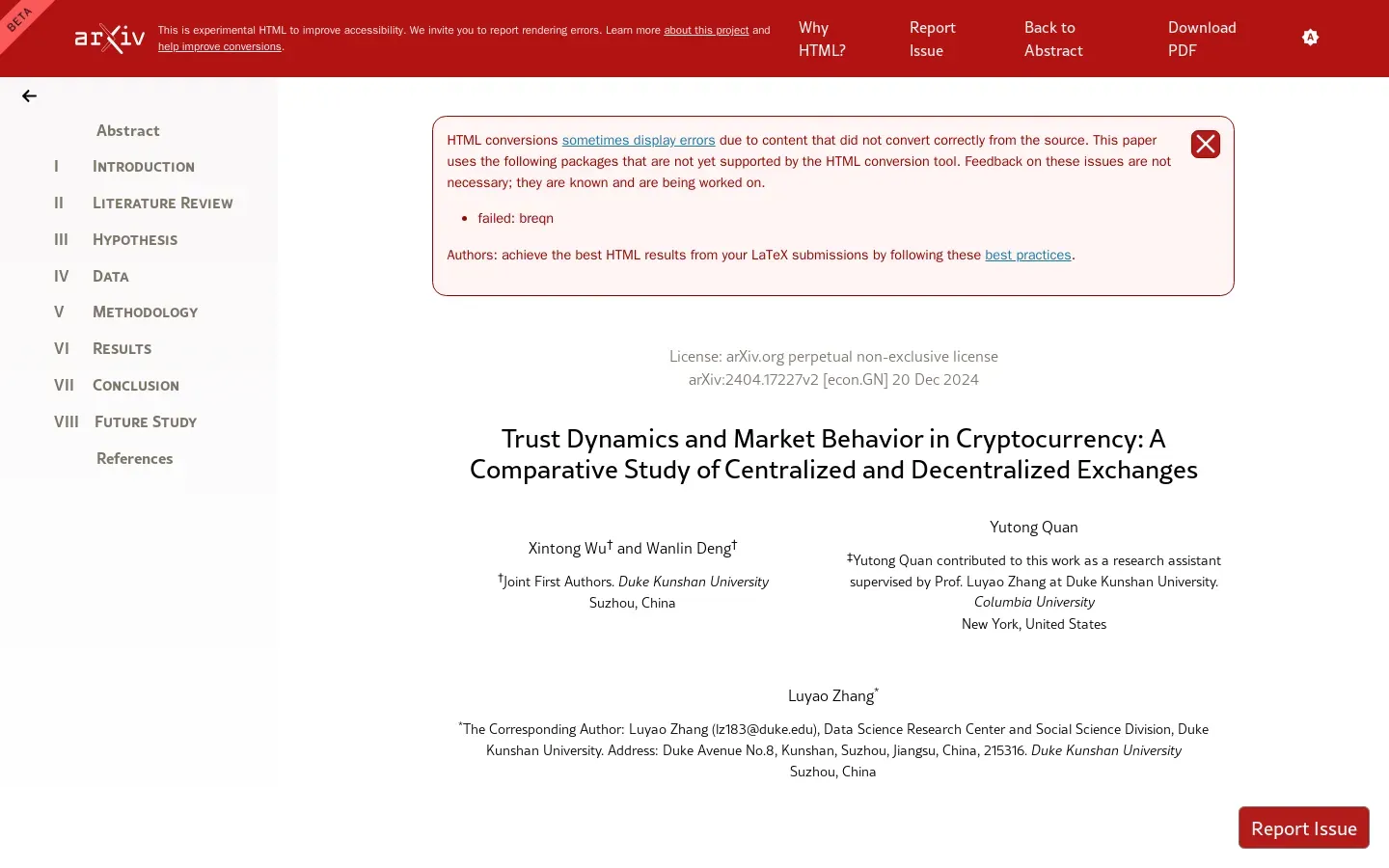
Impact of FTX Collapse on Cryptocurrency Trust and Market Dynamics
/ 4 min read
Quick take - The article examines the repercussions of the FTX cryptocurrency exchange collapse on market dynamics and user trust, revealing a decline in cryptocurrency prices and a shift from centralized to decentralized exchanges, while emphasizing the need for improved cybersecurity measures and trust frameworks in the industry.
Fast Facts
- The FTX collapse has significantly impacted cryptocurrency prices and user trust, leading to a shift from centralized exchanges (CEXs) to decentralized exchanges (DEXs) due to demands for transparency and security.
- Research methodologies include Regression Discontinuity Design (RDD), natural language processing (NLP), and geospatial analysis to assess market dynamics and user behavior post-collapse.
- Findings indicate a notable decline in token valuations, with trust emerging as a critical factor influencing market sentiment and exchange preferences.
- The study emphasizes the need for enhanced cybersecurity measures and the establishment of trust measurement frameworks to restore user confidence in cryptocurrency exchanges.
- Future research directions include developing trust metrics, improving user education, and analyzing regional differences in user behavior to strengthen the cryptocurrency ecosystem.
The Ripple Effect of FTX’s Collapse: Shifting Trust and Market Dynamics in Cryptocurrency
The recent collapse of the FTX cryptocurrency exchange has sent shockwaves through the digital finance landscape, prompting extensive research into its repercussions on cryptocurrency prices and user trust in different trading platforms. This incident has raised two primary questions: how the FTX scandal has influenced token valuations and what shifts have occurred in user preferences between centralized exchanges (CEXs) and decentralized exchanges (DEXs).
Unraveling the Impact
The research employs a multifaceted approach to assess the fallout from the FTX collapse. Utilizing causal inference methods, natural language processing (NLP) techniques, and network analysis, researchers have delved into the intricacies of this financial debacle. Key methodologies include Regression Discontinuity Design (RDD) for evaluating price impacts, Latent Dirichlet Allocation (LDA) for sentiment analysis, and geospatial analysis to understand user behavior patterns.
Key Findings
The findings reveal a significant decline in cryptocurrency prices, heavily influenced by a loss of trust among investors. The collapse has led to a pronounced shift in user preferences, with many moving away from CEXs towards DEXs. This transition is largely driven by a desire for greater transparency and security in light of the FTX incident. Furthermore, the research highlights trust as a critical determinant in token valuation, suggesting that market participants are increasingly wary of centralized platforms.
Implications for Cybersecurity
These findings underscore the pressing need for enhanced cybersecurity measures within cryptocurrency exchanges. As user trust becomes increasingly fragile, exchanges must adopt comprehensive strategies that not only address security vulnerabilities but also prioritize regulatory compliance. The research advocates for establishing trust measurement frameworks and real-time sentiment analysis tools to help exchanges regain user confidence.
Methodological Strengths
The research benefits from a robust methodological framework and the application of advanced analytical tools, providing a nuanced understanding of market dynamics post-FTX collapse. The integration of behavioral analysis also allows for deeper insights into user sentiment during crises.
Limitations and Future Research
Despite its strengths, the study acknowledges limitations, such as the need for longitudinal data to fully capture the evolving nature of user trust and market reactions. Future research may focus on cross-platform trust dynamics and developing regulatory frameworks tailored to cryptocurrency.
Recommended Tools and Techniques
The research discusses several tools and techniques crucial for further investigations:
- Regression Discontinuity Design (RDD): To analyze changes in market behavior around the FTX collapse.
- Latent Dirichlet Allocation (LDA): For identifying emerging topics in user sentiment and discourse.
- Geospatial Analysis: To assess regional differences in user behavior and trust levels.
- CausalStock Framework: To evaluate causal relationships between events and market movements.
Future Directions
Looking ahead, the research outlines several promising avenues for future exploration:
- Enhanced User Education and Awareness Programs: To equip users with knowledge about the risks and benefits of different platforms.
- Development of Trust Metrics for Exchanges: To provide users with clear indicators of platform reliability.
- Behavioral Analysis of User Sentiment in Crisis Events: To better understand how crises shape long-term user behavior.
- Integration of Geospatial Analysis in Risk Assessment: To tailor strategies based on regional user responses.
By focusing on these areas, researchers and practitioners can contribute to a more secure and trustworthy cryptocurrency ecosystem, fostering greater user confidence and broader participation in digital finance.



